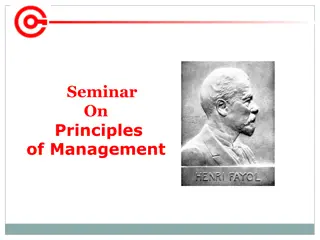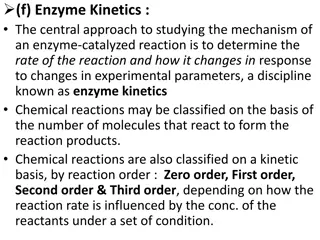Henri Fayol's 14 Principles of Management
Henri Fayol, a prominent figure in management theory, introduced 14 key principles of management that are still relevant today. These principles cover aspects such as centralization, division of work, authority, discipline, unity of command, and more. Fayol's theories have had a significant impact on the field of management, providing guidelines for organizational structure and managerial decision-making.
Download Presentation

Please find below an Image/Link to download the presentation.
The content on the website is provided AS IS for your information and personal use only. It may not be sold, licensed, or shared on other websites without obtaining consent from the author.If you encounter any issues during the download, it is possible that the publisher has removed the file from their server.
You are allowed to download the files provided on this website for personal or commercial use, subject to the condition that they are used lawfully. All files are the property of their respective owners.
The content on the website is provided AS IS for your information and personal use only. It may not be sold, licensed, or shared on other websites without obtaining consent from the author.
E N D
Presentation Transcript
Henri Fayols 14 Principles of Management
Contents Introduction Centralization Division of work Scalar Chain Authority Order Discipline Equity Unity of Command Stability of Tenure Personnel Unity of Direction Initiative Subordination of individual interest to general interest Espirit De Corps Remuneration
Principles of Management Management principles are a set of fundamental truths based on logic which provides guidelines for managerial decision making and other actions. These principles are derived: On the basis of observation and analysis i.e. practical experience of managers. By conducting experimental studies
Features of Management Principles HAVE CAUSE AND EFFECT RELATIONSHIP FLEXIBLE UNIVERSAL AIMS AT INFLUENCING HUMAN BEHAVIOR EQUAL IMPORTANCE
History Henri Fayol Henri Fayol was born in Istanbul in 1841. When he was 19, he began working as an engineer at a large mining company in France. He eventually became the director, at a time when the mining company employed more than 1,000 people Fayol began to develop what he considered to be the 14 most important principles of management. Essentially, these explained how managers should organize and interact with staff In 1916, two years before he stepped down as director, he published his "14 Principles of Management" in the book "Administration Industrielle et Generale" Fayol also created a list of the six primary functions of management, which go hand in hand with the Principles Fayol's "14 Principles" was one of the earliest theories of management to be created, and remains one of the most comprehensive
Division of work Division of work is a famous principle of economics, invented by the traditional economist, Adam Smith. Fayol had applied this principle in the context of business enterprise. Division of work leads to specialization which results in increased human efficiency. Through the application of this principle the production can be increased with same amount of human effort
Authority Definition and Meaning The term authority implies the right and power of a person to exercise discretion to make decisions, to issue orders, to use organizational resources and to hire and fire employees. It is the sum of rights and powers entrusted to a person to enable him to perform the assigned tasks The right to give order and the power to exact obedience Henri Fayol
Advantages of Unity of Command Good, effective and efficient discipline Reduces and/or avoids duplication of work Clear and well- organized Authority, Responsibility and Accountability Better coordination and team work Leads to higher productivity of goods and services Prompt or quick decision making Better relation- ship among superior and subordinates Boosts morale and positive attitude of workers
Elements of Direction Communication A manager has to tell the workers what to do, how to do it and when to do it. He is also required to provide continuous guidance to the workers in the performance of their task Leadership Leadership is the ability to build up confidence and zeal among the people and to create an urge in them to be led Motivation While directing, the manager has to create in his subordinates the willingness to pursue the goals of the organization enthusiastically Supervision Supervision means overseeing the subordinates at work. Effective supervision ensures greater output of high quality Coordination It is the process of directing the activities of various persons in unison to attain objectives
Decentralized approach vs. Centralized approach Bottom-to-top-approach Top-to-bottom-approach Level 1 Level 2 Level 3 Level 4 Decentralized approach Centralized approach
Scalar Chain and Gang Plank In the figure, the scalar chain in an organization is represented by two ladders, A to F and A to P Scalar chain & Gang Plank A Any communication from F to P has to flow upwards to A through E, D and C and B then downwards through L, M, N and O. It will obviously take a long time B L C M D N So in order to minimize the delay involved in communication, a gang plank between F and P may be created as shown by the dotted line. E O F P However, the Gang Plank should not be a normal practice as it undermines the established line of authority
ManagementStudyGuide.com This is a DEMO Course On Principles of Management. Join MSG Premium Membership and Get Access to around 120 Courses + New courses added every week. What You Get: 1. View All Courses Online. 2. Download Powerpoint Presentation for Each Course. 3. Do the Knowledge Checks for Each Course.























